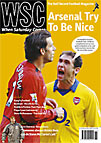 The Atlantic islad has two thriving teams in Portugal's top flight but, as Jon Spurling explains, some want to wreck that by recreating the Faroe Islands, only with sunshine
The Atlantic islad has two thriving teams in Portugal's top flight but, as Jon Spurling explains, some want to wreck that by recreating the Faroe Islands, only with sunshine
On the face of it, football on Madeira, 500 miles south-west of Portugal, is enjoying a boom. In late September, Maritimo, the island’s only fully professional side, were joint top of the Portuguese league. Nacional, the island’s second team and not yet full time, were in mid-table. But if certain political groups get their way, the golden era may be brief.
When Maritimo took on Beira Mar on the first day of the season in the capital, Funchal, it was clear that a mood of disquiet reigned among factions of the home support. As fans made their way to the club’s compact 10,000-capacity stadium, their path was blocked by two paper-wielding men handed out A4 size leaflets.
Carlos Costa, a “true” Maritimo fan, told me : “The fans don’t get on at all. There is a lot of tension between working-class supporters and the more affluent ones, the quintas [the Portuguese for a large house]. Look in the phone book: you’ll find many on the island have names such as Reid, Williams or Smith, because they are descendants of the 19th-century colonialists. Also, there are lots of Ferreiras and Henriques, who are the descendants of Portuguese nobility. Many of us younger Madeirans don’t like to be reminded of our colonial past and we can’t even escape it at football. The quintas tend to sit in the best seats. They do not sing, they do not chant, they add nothing to the atmosphere at the game. They just sit there. We would rather the ‘colonialists’ have nothing to do with the club.”
The leaflets contained selected ditties to be directed at the quintas and, during the first half, these chants were aimed at those in the more expensive seats. Carlos Costa’s prediction came true. The quintas maintained a stoic silence. One of the chants, roughly translated, meant: “Colonialists, go away.” All this shed further light on the key issue threatening the futures of Maritimo and Nacional.
Madeira has been under Portuguese rule for almost 200 years. However, there is a growing independence movement led by Jaime Ramos, general secretary of the PSD (Social Democratic Party). Four PSD MPs dominate Madeiran affairs. As the February 2002 general election left a hung parliament, the four have more of a voice in national politics than they could have dreamed of.
Party representatives can be found milling around at Maritimo games. PSD official Nuno Salvadores told me: “The aim is that Madeira will have its own national team that will participate in the World Cup and European Championship within ten years. We have fine support for independence at Maritimo matches.”
Over the past few years, Madeira has begun to edge further away from Portuguese control. Since 2000, Lisbon has cut its annual expenditure on the island by over a third and the regional president, Alberto João Jardim, recently announced that due to the wealth generated by the ever-expanding tourist industry, the island will soon be able to become virtually self- sufficient. From a football angle, the Madeiran independence movement also points out that the Faroe Islands, population 25,000, and an autonomous part of Denmark, have their own national team. Why not Madeira, with a far greater population of 250,000?
Many fans I spoke to at the match, which Maritimo won 1-0, expressed their support for a competitive Madeira national team. Costa commented: “We have the population to support such a move and the island could do very well on a national stage. The team would play their games in this ground.” He seemed unaware of the likely consequences for Maritimo. If further Madeiran autonomy – or full independence – were achieved, Maritimo – and Nacional – would no longer be able to compete in the Portuguese league.
It would be nigh on impossible to set up a competitive Madeiran league, given that roughly three quarters of the population live in Funchal, so Maritimo – who just two years ago pushed Leeds United close in a UEFA Cup tie – would be left high and dry, in a league little stronger than that on the Faroe Islands. Carlos Costa seemed blind to the fact that his club could face ruin in the event of such a change. It certainly didn’t stop him resuming his chants about Maritimo’s wealthier fans “going away”. He later told me he can’t wait to see “Figo’s Portugal and Beckham’s England – the old colonialists – get stuffed by Madeira some day”.
When I told the PSD’s Salvadores of events at the game, he shot me a knowing look and commented: “Football and politics can never be separated – not even on Madeira.” Sadly, he appears to be right.
From WSC 201 November 2003. What was happening this month